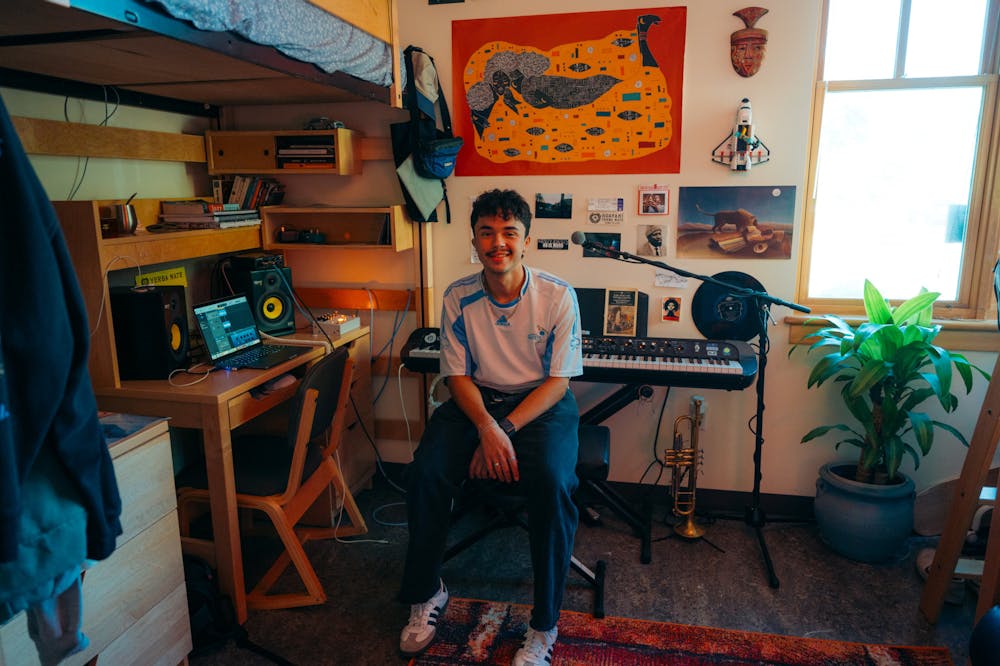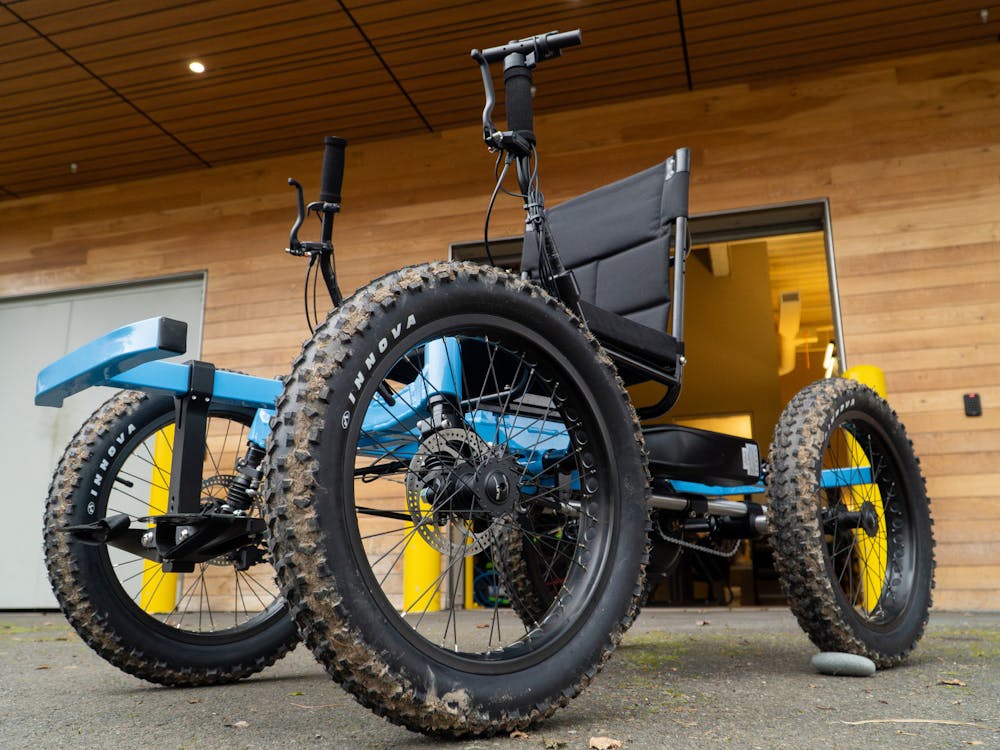Leticia Dankel and Andrew Dankel-Ibanez wrapped a pair of headphones around Leticia's pregnant belly, playing a variety of music from classical to songs by jazz musician Miles Davis for their unborn baby. Inside the womb was Andrés Dankel, becoming immersed in the world of music.
Coming from a Colombian and Guatemalan household, and four generations of musicians in his family, it was as if Dankel was destined for music.
“I was never one of the kids that felt forced into it and didn't want to do it,” Dankel said. “I've been playing piano since I was four … I've been just listening to music my whole life. It's been a part of me."
19 years later, music has become Dankel’s passion. The sophomore music and political science double major performs as dré elijah is on Spotify and as a live performer in Portland, Seattle and his hometown of Walla Walla, Washington.
Although primarily rooted in jazz, Dankel’s music incorporates other genres, varying from hip hop to samba.
“He always wants to bring something new to the table,” Denise Gallardo, one of Dankel’s close friends, said. “He's constantly pushing boundaries, which I find so cool.”
A significant influence for Dankel’s sound stems from his family’s Latinx roots.

“I also take a lot of inspiration from the music that I grew up listening to,” Dankel said. “Being Latino, I always had a bunch of different music, like salsa and cumbia and stuff like that. That just really influenced my style.”
With a father in a reggae band and a grandfather that plays the trumpet and guitar, Dankel has been able to play music alongside his family. Memories of the trio playing together hold a special place in Dankel’s father’s heart.
A special moment for Dankel’s father was during a Michael Jackson themed gig, where his band needed someone to moonwalk on-stage. He watched as his then six-year-old son fearlessly took the stage.
“He just seized the moment and was just totally present,” Dankel-Ibanez said. “Anybody who was present in the band or in the stands remembers that moment, the little guy that did that.”
As a fellow performer, Dankel’s father has gotten first-hand experience to watch his son grow as a performer. Although he recognized early on that Dankel was a “better performer” than he was, he continues to be impressed by how far his son has taken his musical journey.
“It’s surreal, it’s everything you could want as a parent,” Dankel-Ibanez said. “To see the thing that you love and the thing that’s always been a part of your life as well … He has the potential and has already taken it further than I could have ever imagined.””
Despite not being a musician herself, Dankel’s mother has played a vital role throughout his musical journey and is one of his biggest inspirations.
Coming from San Francisco, a pueblo in the state of El Peten, Guatemala, Dankel’s mother grew up hearing the car stereos blasting music in the busy streets, to having the radio stations playing marimba music at 12 p.m. every day in her pueblo.

She has also been the catalyst for his fearlessness. Encouraging her son with “si se puede” (it can be done) or pushing him to speak up for himself, she has encouraged him to never be afraid. It is a trait that both Dankel and his mother heavily credit their Latinx identities for.
“I just think that growing up with my parents and growing up with the culture that they have, it's such an influence on who I am,” Dankel said. “I wouldn't be who I am without my mom and her strong mentality.”
With his mother’s voice in his head pushing him to speak up, Dankel has participated in advocacy work. After the Uvalde shooting in Texas in 2022, Dankel and his former classmates organized a school-wide walkout in protest of gun violence and a vigil to commemorate the lives of the students that died during the shooting.
During a demonstration in downtown Walla, Walla, Dankel was photographed reading a poem he wrote to fellow protesters, a moment that made its way to the local newspaper.
“It's so much more about art being a catalyst for social change and being a part of that social change that I think is it we would be remiss not to talk about,” Dankel-Ibanez said.
Another factor that has impacted Dankel’s musical journey is his identity as a partially deaf person. For the first 8 years of his life, Dankel was going in and out of the Seattle Children’s Hospital for a condition called microtia, a condition that causes Dankel to be completely deaf in his right ear.
Living without a hearing aid until he was 17, Dankel had to take a unique approach when making music.

“I was always too scared of what people would think of me,” Dankel said. “It is super unique because I never had the ability to hear two sounds. That's just something special that I have been able to explore… the ability to hear stereo sound versus mono, which is something that I haven't had for most of my life.”
Dankel feels pride in his identity and hopes to be a sense of inspiration for other children who share his condition. Last year, he was invited as a guest speaker on a panel at the Seattle Children's Hospital about hearing fatigue. This is the tiredness that deaf people feel as a result of having to use more energy than the average person to hear. Dankel was recommended by his surgeon for the panel, as she knew about his music and believed he could inspire others with this story.
“It really helped me because I had never been in a community of other people that had similar experiences to mine,” Dankel said. “It was just something really special and a beautiful journey.”

Through it all, Dankel is continuing his journey as an artist and hopes to one day become a professional musician. As a deaf, Latinx jazz musician, he notes the importance in seeing representation for marginalized communities.
One day, he wants to be the representation he would have liked to have when he was younger.
“I'm someone still trying to find my own voice in my identity,” Dankel said. “And I'm really excited for that path.”
Tiffany Marquez Escobar is a reporter at The Beacon. She can be reached at marqueze25@up.edu.
Correction: A previous version of this story had Dankel's stage name as "elijah' dré'." That is incorrect, it is "dré elijah."








